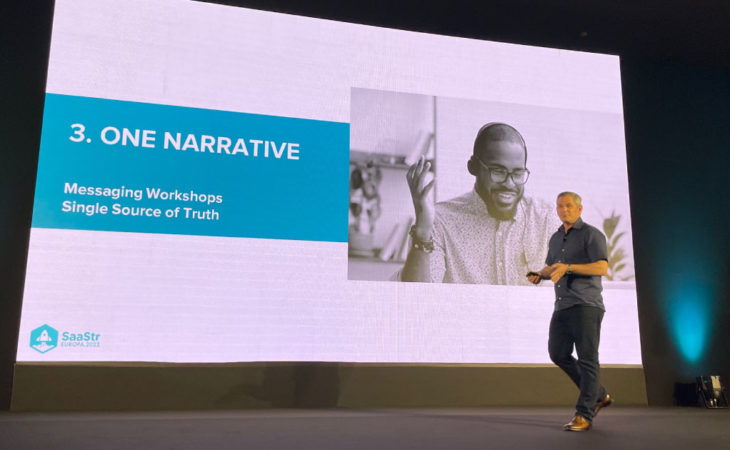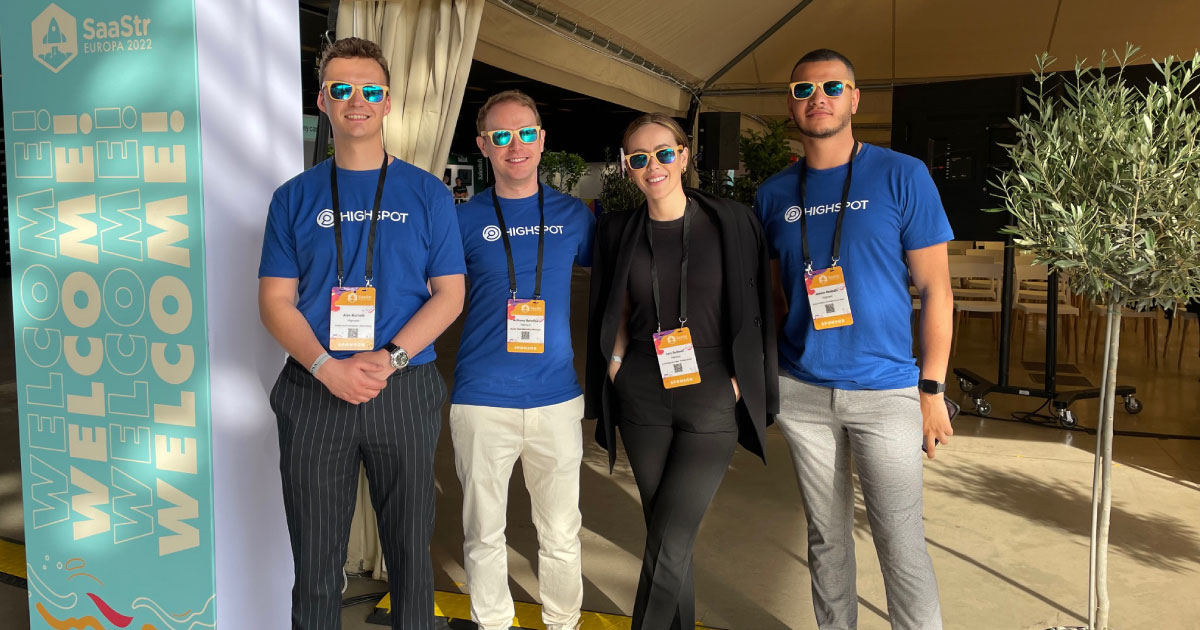There’s no better way to get back to live events than in the city of Barcelona and at SaaStr Europa 2022. After a two year hiatus, the event was back and Highspot was a proud sponsor. SaaStr is the world’s largest community for B2B software and this year’s event was attended by over 2,700 B2B Founders, Execs and VCs from over 60 countries.
The event’s mission is to encourage early B2B software companies to share, scale and grow together. There’s something about meeting prospects, customers and investors in person and learning about the impact sales enablement has had on driving efficient business growth that is truly inspiring.
A key theme from the event was the discussion around sales and marketing alignment. A theme which came up in several conversations and talks on the stage. It was also one of the common challenges that attendees raised when they visited our booth. Regardless of company size or location, everyone was struggling with content chaos, the struggle associated with aligning GTM activity to drive revenue as well as the challenge faced with creating a single source of truth for analytics and data.
Here are three key takeaways that you can implement straight away:
1. Avoid The TOFU Content Trap
Marketing can often focus on creating content for top of the funnel (TOFU) to drive leads. That’s understandable as it’s easier to measure TOFU content that goes out via external marketing channels, as opposed to via your sales team. The impact of relying on this approach means that although marketing provides air cover to sales with lead generation, there isn’t much other interaction.
Jessica Gilmartin, Head of Revenue Marketing at Asana provided some valuable insights at her ‘How Three Data Points Can Drive Revenue’ talk. At Asana, her team apply a campaign approach to their annual ‘Anatomy of Work Survey’ which spans multiple countries.
Her team ensures that both sales and marketing collaborate on content ideation from day one. As a result of this collaborative effort, the survey provides a rich source of data points that are harvested for three key stages across the funnel:
- A ‘page turner’ data point for TOFU which is an evocative hook to engage prospects from the outset
- An ‘authority builder’ data point for MOFU (middle of the funnel) to show credibility
- And finally a ‘story conflict’ data point is that is connected to a newsworthy issue to drive timely urgency at BOFU (bottom of the funnel)
Incorporating these three data points ensures that marketing provides valuable content for the sales team across the entire buyer journey. This also helps teams to create content which drives revenue across the full funnel and most importantly is adopted by the sales team.
This is also one of the reasons customers love using Highspot. Having the visibility to see what content is being pitched by sales teams and what messaging is engaging prospects the most, not only refines messaging, it also ensures that both sales and marketing remain aligned on the direction of content creation efforts.
2. Sales Can Help Marketing To Spend Smarter
It was great to see both marketing and sales leaders on stage together to discuss the challenges with alignment. Director of Marketing, Suzanne McVey and Nick Adams, VP of Sales at Globalization Partners, shared some great tips at their ‘How Sales and Marketing Can Be Each Other’s Biggest Asset’ talk. It’s easy for marketers to think they ‘own’ and know their target audience, but they may not have all of the intel they need. In the B2B Marketing Study by MarketingSherpa it is highlighted that the biggest barrier to marketing success is a ‘lack of insight on target audience’.
Your sales teams are on the front line to your target audience and the insight they gain through every interaction on the buyer’s journey is a gold mine that’s waiting to be tapped into.
Marketing should ensure that they regularly take time to learn more about their target audience and their pain points. Sales teams can help with this continuous learning by recording and inviting marketing teams to join sales and pipeline calls. Also by diligently noting closed, lost and won reasons – plus suggesting new reasons.
This is where having a sales enablement function or tool in your business can become paramount to success. Enablement is the bridge between sales and marketing alignment and ensures that everyone is included on the journey to driving pipeline and revenue growth.
3. Consistent Alignment: From Goals, To Trust, To One Narrative
Highspot CMO, Jon Perera, gave a talk on The Secrets to Getting Sales and Marketing to Work Together Better. Based on his experience helping scale two different businesses from $10M ARR to over $100M, his five key tips really resonated with the audience in the room. Starting with a clear definition of alignment is the first cornerstone. Alignment is a critical challenge that’s felt by tech companies of all sizes.

Recent research by The Alexander Group shows that only 35% of B2B sellers in the technology vertical achieved quota last year. Plus, only 65% of the content generated by marketing is ever used by sales (Forrester). It’s imperative that sales and marketing are aligned as there is a huge upside when it comes to driving revenue. Companies that align sales and marketing teams achieve 24% faster growth rates and 27% faster profit growth (Forrester).
Shared goals are essential. Not only in the form of a scorecard but through tactics such as a seller confidence survey. Jointly authored by sales and marketing leadership, this can shine a light on seller confidence in pricing, differentiation, negotiation skills and more. When done correctly, sales and marketing can align on improving areas that drive higher performance, together as one team.
It also all starts with your narrative. As marketers, we spend hours crafting the perfect “TED Talk” on vision and competitive differentiation for the company or product line. These scripts often have a way of becoming the default customer overview deck that we expect the front line SDRs and AEs to deliver. But it often doesn’t land as we’re talking to very different audiences. The impact of this is that your business ends up with a brand and message that is diluted, or potentially mis-aligned between sales and marketing.
To overcome this, a messaging workshop needs to be set up. Bringing the CEO, key sales and marketing leaders and front line sales reps together to craft one narrative that scales from the “TED Talk” down to the initial discovery call ensures that your teams are all brought into the messages that are being cascaded down to customers. This is only truly effective if you have a single source of truth for the company narrative, whether it’s the one customer overview deck or the core sales content that’s needed at each step of the buyer’s journey.
Putting a sales content management framework in place by leveraging tools such as Highspot you’ll be able to access detailed metrics on “what’s working” with the buyer and get clear on what’s truly impacting the bottom line.
In conclusion, sales and marketing alignment comes from trust, sharing and partnership from day one. Leveraging a sales enablement platform ensures that marketing content lands with the sales teams and is the secret sauce that many marketing and sales teams have striven to achieve for years.




